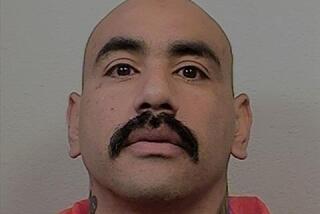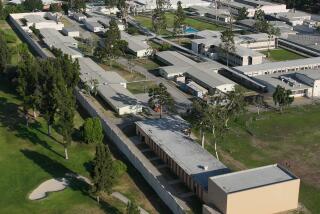Men Crippled by Violence Offer Straight Talk to Youths : Crime: The pair advise housing project residents to walk away from trouble-- while they can still walk.
- Share via
George Modica wheeled himself to the center of the room Monday and displayed the funeral program for all to see. On it was a picture of a 16-year-old boy, now dead, killed by a bullet to the head not two weeks before.
That boy had been his nephew, yet another victim of the sometimes-violent environment of South-Central Los Angeles. There had been a fight, and the other boy had gone home for the gun.
“I told my nephew over and over what could happen to him,” said Modica. “He was warned. He had a chance.”
The young crowd of perhaps two dozen listened in rapt attention to this man in a wheelchair, himself a victim of a bullet to the back that paralyzed his lower body four years ago. With him was Lonnie Washington, also in a wheelchair, a former gang member and prison inmate who lost the use of his legs in 1992 when he was shot while his car was being stolen.
The audience was made up of children who live in Southern California housing projects, brought together to discuss drugs, gangs and other maladies afflicting their neighborhoods. They had participated in a poster contest sponsored by the Assisted Management Housing Assn., a nonprofit group of companies that oversees more than 75,000 housing units in Southern California, and the one-day conference at the Los Angeles Airport Marriott Hotel was a reward for the estimated 350 youths in attendance.
And for several one-hour sessions Monday, Modica, 27, and Washington, 26, held the attention of group after group as they talked about how a bullet had changed the way they looked at life. Now, both are members of Youth Alive, a Los Angeles program devoted to violence prevention and intervention for teen-agers. The emphasis for them is encouraging young people to walk away from trouble.
“I was in the wrong place,” said Modica. “I was in a place with guns and drugs and violence. But I was there because I wanted to be there.”
He said several youngsters, all about the same age as those in the room, walked up and shot him in the back, paralyzing him from the waist down. At the time, he had only recently been released from prison, where he had done time for armed robbery.
“Just a little, bitty bullet can take your life,” he said. “That little, bitty bullet is the reason I can’t walk now.”
The words came without remorse, as he told the young audience that they can walk away from fights, that gang life will never work in the end.
“You can choose whatever direction you want to go,” he said. “There are people out there with guns and they don’t care about you. But there are people who do care.”
Then it was Washington’s turn. He talked about his prison time for the possession and sale of crack cocaine and of the time in 1992, only a few months after his release, when he was shot repeatedly while his car was being stolen. He said the men who had shot him started reaching into his pockets for the car keys, as if what they had just done was of no consequence.
“And then I was on the ground, bleeding, dying,” he said. “I thought it was like a movie, like I was going to die there on the street and right then I knew I was paralyzed.”
Washington’s recovery took months, and in the process, he became involved in Youth Alive. Now he, Modica and others in the program visit dozens of classrooms and conferences a month to tell their stories.
Washington reached over and pulled himself onto a straight-backed chair in the middle of the room. Then he told a young boy to try out his wheelchair. The boy was having fun, rolling around the room, when Washington reached for the wheelchair and tipped it backward. The boy’s head was almost touching the ground.
“I want you to see how it feels to be in this chair,” Washington said. “Now imagine, I have to do this for the rest of my life. I can’t get up and walk back to my seat.”
As the program was ending, Modica and Washington asked the children what they thought they could do to improve their lives. The answers had an unexpectedly sweet quality to them.
“We can get along,” said one.
“Help each other,” said another.
“Give yourselves a hand,” said Washington. “You guys have been good.”
More to Read
Sign up for Essential California
The most important California stories and recommendations in your inbox every morning.
You may occasionally receive promotional content from the Los Angeles Times.













